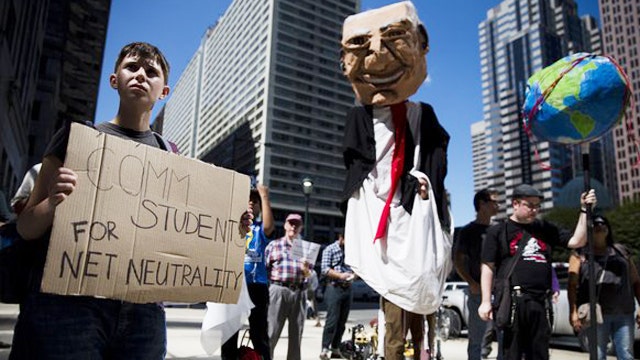FCC approves 'net neutrality' rules for Internet providers
Glympse's Hillery Nye on the long-term implications of the historic Internet regulatory vote
The telecom industry on Thursday slammed the The Federal Communications Commission’s adoption of sweeping new Internet regulations, warning that the rules are a "radical step" that spells bad news for consumers and the economy.
Following a contentious meeting, the commission voted 3-2 to adopt its so-called net neutrality plan. The new regulations, which aim to bar service providers from creating paid Internet “fast lanes,” were sought by President Obama. FCC Chairman Tom Wheeler said that the plan would ensure an "open, unfettered network."
However, major telecom industry players were scathing in their reaction to the vote, which looks set to be challenged in the courts.
“FCC’s ‘Throwback Thursday’ Move Imposes 1930s Rules on the Internet,” wrote Verizon, in a blog post. To illustrate its point, the company wrote its statement in Morse code, but added a link to a translated version for “readers in the 21st century.”
Further emphasizing Verizon’s displeasure, the translation uses a smudged, inky, typewriter-style typeface.
“Today’s decision by the FCC to encumber broadband Internet services with badly antiquated regulations is a radical step that presages a time of uncertainty for consumers, innovators and investors,” said Michael Glover, Verizon senior vice president for public policy and government affairs, in the statement. “It is likely that history will judge today’s actions as misguided,” he added.
The CTIA, which represents the wireless industry, described the FCC’s decision as “disappointing and unnecessary.”
“Consumers across the U.S. have – and will always have – access to an open mobile Internet,” it said. “By ignoring the fundamental differences in wireless networks and disregarding the intense competition throughout the mobile ecosystem, the FCC abandoned a long-standing policy framework responsible for fostering America’s world-leading wireless industry.”
The CTIA also questioned the legality of the FCC’s move.
“The agency’s action runs counter to an express Congressional directive prohibiting the agency from treating mobile broadband like a utility service, making today’s decision not only unwise, but unlawful,” it said. “The economic and legal uncertainty that will inevitably follow from the FCC’s unilateral action underscores the importance of, and urgent need for, bipartisan Congressional action that can end the net neutrality debate and allow our country’s mobile ecosystem to focus on what it does best – innovating, investing and empowering Americans’ mobile connected lives."
The new rules would put the Internet in the same regulatory camp as the telephone by classifying it like a public utility.
Net neutrality is the idea that websites or videos load at about the same speed. That means you won't be more inclined to watch a particular show on Amazon Prime instead of on Netflix because Amazon has struck a deal with your service provider to load its data faster.
For years, providers mostly agreed not to pick winners and losers among Web traffic because they didn't want to encourage regulators to step in and because they said consumers demanded it. But that started to change around 2005, when YouTube came online and Netflix became increasingly popular. On-demand video began hogging bandwidth, and evidence surfaced that some providers were manipulating traffic without telling consumers.
By 2010, the FCC enacted open Internet rules, but the agency's legal approach was eventually struck down in the courts. The vote Thursday was intended by Wheeler to erase any legal ambiguity by no longer classifying the Internet as an "information service" but a "telecommunications service" subject Title II of the 1934 Communications Act.
That would dramatically expand regulators' power over the industry and hold broadband providers to the higher standard of operating in the public interest.
The Telecommunications Industry Association (TIA), which represents the manufacturers and suppliers of communications networks, also expressed its dismay at the FCC’s decision.
“We share the goal of an open Internet, but Title II regulation is unnecessary and will harm consumers and the economy more than it will help,” it said, in a statement. “A light regulatory approach has resulted in nearly two decades of remarkable technology progress and increasing speeds, access and choice.”
The TIA also noted that private sector investment has led to a 250 percent increase in connection speeds since 2010 – jumping from 4.6 Mbps to 11.4 Mbps.
“We are confident that Title II regulation will be rejected as Congress, the courts and consumers fully understand how it will hold back investment, innovation and growth,” the TIA added. “While we support the coming legal challenges, our plan is to work with Congress to find a reasonable, balanced approach to an open Internet.”
The Associated Press contributed to this report.
Follow James Rogers on Twitter @jamesjrogers





















